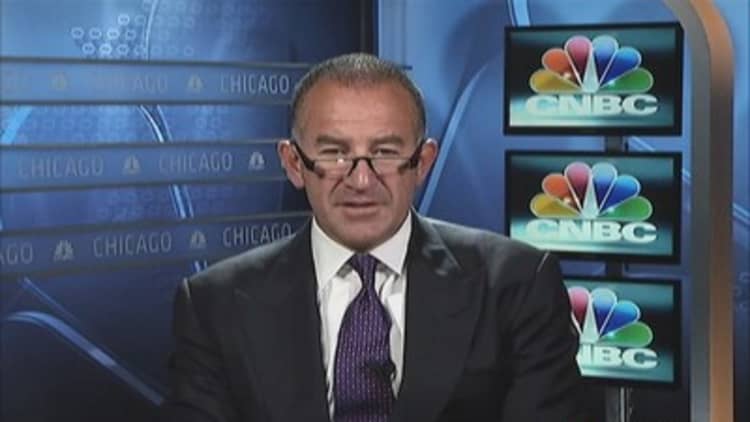The dozens of Web-based advisory firms that have launched in the last decade don't seem like much of a threat to financial advisors.
As a group, they have collected a small fraction of the assets managed by traditional advisors, and their client base of do-it-yourself investors and younger individuals with small amounts of assets are typically not the traditional advisor's target market, anyway.
The so-called robo-advisors, however, are a force to be reckoned with.
Their low-cost service delivery models and the increasingly sophisticated tools they offer to investors represent the future of the industry. Leaders of top wealth management firms may not see them as immediate threats, but they ultimately could have a major impact on the market for financial advice.
"When you think of financial planning, 70 percent of it can be put on a piece of paper for the typical young family," said certified financial planner Russell Hill, chairman and CEO of registered investment advisor Halbert Hargrove, the second-highest-rated fee-only wealth manager in CNBC's recent Top 100 Fee-Only Wealth Management Firms list. "The robo-advisors are going to put pressure on everybody in the industry and force advisors to demonstrate their value to clients."
Read MoreRanks, rates of fee-only advisors to rise
Hill's firm, which manages nearly $4 billion in assets, is building out a technology platform to offer more services to existing clients and to potentially smaller investors who don't meet the firm's $1 million minimum threshold of assets. He's not doing it because he fears he'll lose clients to Web-based advisors charging a fraction of what he does, but because he expects technology to increasingly be the preferred means for people to access advisory services.
The typical online advisory firm asks clients a series of questions about their finances, goals and tolerance for risk and, depending on the answers, recommends portfolios of funds, stocks and bonds. The portfolios can usually be automatically rebalanced for a little extra, but most of the websites don't have the means to offer significant tax-, estate- or insurance-planning services.

Carl Domino, president and chief investment officer of Carl Domino—ranked ninth in CNBC's top fee-only advisor list—doesn't see the growing number of robo-advisors as a threat to his firm, which manages more than $282 million in assets for high-net-worth clients.
"I doubt that it's competition for us," he said. "An investor with $2 [million] or $3 million doesn't want to just deal with a website. They hire someone else to worry about their money, so they can sleep at night."
Read MoreCan robo-advisors gain investor assets?
Domino thinks the websites are, nevertheless, offering a valuable service for investors who might not otherwise get any help managing their finances. Like Hill at Halbert Hargrove, Domino is of the opinion that a little planning can go a long way toward helping people invest successfully.
"The trick to managing money is getting adequate diversification, keeping costs down and taking a systematic approach that doesn't change with views of the market," he said. "It's not rocket science; it's discipline.
"If the websites are legitimate, it's a valuable service," Domino added.
Keeping an eye out
"We're watching them, but we don't see them as competition at this point," said Mark Stadtlander, certified financial planner and CEO of Foster Group, a firm managing nearly $1.5 billion. Foster Group was ranked 13th on the CNBC list. "People can answer questionnaires, and they can have portfolios built for them, but they can't get ongoing conversations about their future and what concerns them."
The element of human interaction remains a big competitive advantage for traditional advisors, say wealth management leaders. "What's missing with most of these websites is experience and credentials," said Jana Shoulders, CEO and co-founder of Adams Hall Wealth Advisors, No. 6 on the CNBC list. "They're designed for do-it-yourselfers, and it's great to have those resources available to people, but it's important to have the human component available as well. This is still a trust business."
Read MoreAdvisors must rethink their role
Shoulders, too, thinks engaging people about their finances as they head toward retirement is a very good thing. Her firm has joined a collective effort spearheaded by Mariner Wealth Advisors to offer advisory services to clients without investment minimums.
The resulting firm, FirstPoint Financial, was launched last year and charges 1.25 percent on assets up to $1 million. That's significantly higher than most of the online advisory websites, but FirstPoint also offers access to experienced financial advisors—in face-to-face meetings, if desired.
"Emerging affluent [investors] are sharp people. They see the need and value of good financial guidance," said Shoulders.
More pie, not fewer slices
From advisors' perspectives, the optimistic view of the robo-advisors is that they are expanding the market for financial advice. The planning tools and software algorithms they use to customize services for people who otherwise would not have access to them are helping investors make better decisions with their money.
Best-case scenario: As those investors accumulate more assets, they will be more likely to seek out the robust financial planning services that a traditional advisor can offer.
Read MoreTech will drive advisor business
The more troubling possibility is that robo-advisors could undermine the economics of the advisory industry, just as discount brokers did to the brokerage industry and exchange-traded funds are doing to the asset management industry.
A certain segment of the population will gravitate to the [online advisory firms], but that may change when their lives get more complicated.Mark StadtlanderCEO of the Foster Group
If millennials and the next generation of investors are comfortable getting their financial advice online, Web-based advisors could take a bigger share of the market in the future and put pressure on traditional advisors' fees and profit margins.
At this point, leaders like Stadtlander at Foster Group aren't worried about that prospect. He believes the long-term relationships and holistic planning that advisors offer their clients can't easily be replicated strictly by Web-based offerings.
Read MoreTrust a robot to manage your money?
"A certain segment of the population will gravitate to the [online advisory firms], but that may change when their lives get more complicated," he said. "We're not concerned about them putting pressure on our margins, but we're also not resting on our laurels."





